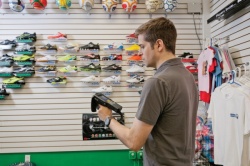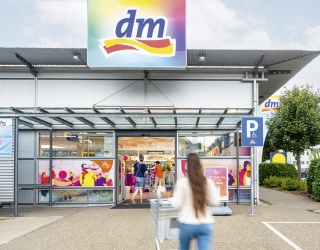
Thanks to increasing digitalization and the rising expansion of smartphones and tablets, customers have new demands on retailer service. Retailers need to meet these requirements to ensure a competitive advantage. Sales assistants in the store however can also utilize mobile devices. By using them, they can get informed more quickly and efficiently, and therefore improve customer service and increase sales figures.
Many consumers already maneuver around the multichannel environment in a secure and competent manner. Almost half of them therefore highly emphasize the availability of digital services at the POS and utilize them on a regular basis. This is something the E-Commerce Center in Cologne, Germany, discovered in a current study on “Digitalization of the Point of Sale“.
This is primarily about basic services in a cross-channel environment such as an online availability query for a specific product, or free WIFI access in the store offered in part by Media-Markt for instance. In each of these cases, 70 percent of surveyed consumers identified these two aspects as very important to them.
The salesperson in the store also benefits
The digitalization of the POS doesn’t just offer the customer a multitude of advantages – there are also solutions that support the salesperson in the store of course. Ideally, they offer advantages for both sides: the sales assistant is better informed and able to offer the customer a variety of new services. The customer on the other hand appreciates the great service and is satisfied with his/her shopping experience.
Retailers can replace the typical stationary, wired POS devices with mobile digital solutions such as tablets for instance. After all, these devices combine a number of useful features for staff members – ranging from information search on specific products to using them as a mobile checkout. In doing so, it gives sales staff more time to take care of customer needs during their entire time spent at the store. The customer of course sees this as a definite plus when it comes to service.
Does retail need specialized devices?
Even though there is a trend towards using consumer devices such as tablets by means of special software to support staff, there are still individual cases where it can be beneficial, and may pay off to use mobile hardware that’s especially developed for retail. This includes barcode scanners, mobile computers and RFID solutions for example.
Motorola Solutions introduced a combination of both type devices at this year‘s EuroShop in Düsseldorf, Germany. With its pocket-sized TC55 touch computer and the ET1 Enterprise tablet, Motorola offers two devices that combine the characteristics of traditional mobile enterprise computers with the design and functionality of consumer devices.
Android solutions increase the performance of store associates and improve customer service. Sales associates can directly call up product information as images and videos to show the customer. They are also able to quickly and easily register barcodes of labels or mobile phone displays or import customer cards. The advantage of using such specialized hardware is that it was completely developed with the special needs of retailers in mind and that unlike standard tablets and smartphones, it doesn’t first need to be retrofitted.
The challenge lies in mobile device management
Based on this, it only makes sense to equip your own associates with mobile devices. However, retailers are then faced with the challenge of monitoring and managing these devices. This is not an easy feat of course, particularly for large chains where the rollout of a new mobile solution means that thousands of devices need to be introduced at hundreds of locations. Another factor is employees that are sometimes not as tech-savvy in the use of current technology as some of their customers.
Data protection represents the biggest problem in this case. After all, the data that is being retrieved on these devices – for instance requesting the warehouse status of an item or mobile payment – can definitely be relevant to business operations. Plus the devices are mobile, which means it is easier to steal or lose them compared to a fixed computer or installed cash register. The mobile devices are therefore also a safety risk for the retailer.
The proper management solution needs to integrate all devices and operating systems
Many existing mobile device management (MDM) solutions have functions that can solve these problems. Yet this brings up another issue: the different mobile platforms – whether that‘s iOS, Blackberry, Windows Mobile or Android – pose special challenges on MDM. A truly comprehensive solution therefore needs to be able to integrate both the retailer’s existing IT infrastructure as well as the existing devices and operating systems.
The salesperson is still essential
Today, brick-and-mortar retailers are not just competing with each other, they also compete against stronger online retail. Compared with a simple and quick purchase from your couch at home, it is especially important for retailers to create faster and simpler ways to make brick-and-mortar purchases. With the use of mobile devices at the POS, they are able to step up to the challenge and satisfy the customer’s need for information at the time as well as integrate all relevant distribution channels.
Perhaps the most crucial factor is and remains the sales associate in the store. He/she needs to be able to use the mobile devices quickly and correctly to provide the customer an added value through service. This is important, particularly in terms of the implementation of a cross-channel strategy. If used properly, the mobile devices provide direct access to all relevant customer data as well as the inventory control system and thus facilitate sales and service that covers all channels.
This is why mobile devices definitely provide retailers an additional benefit. Nevertheless, the sales associate is and remains an important factor in closing a sale in retail. Retailers therefore need to opt for well-trained staff, while also giving them the opportunity to service customers as quickly and professionally as possible by providing the right technical devices.
By Daniel Stöter, iXtenso.com




